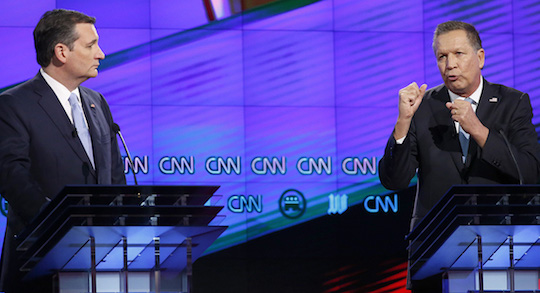Confirming your uncle’s Facebook theories, John Kasich and Ted Cruz have agreed to stay out of each other’s ways in Indian, Oregon and New Mexico, in an effort to prevent Donald Trump from winning the Republican nomination outright. Cruz gets Indiana, where he’s polling eight points behind Trump but lags by only two if Kasich leaves the race. Kasich gets a new blanket and a can of soup,1 and Citizens United v. FEC gets even more laughable in its ban on “coordination” between Super PACs and campaigns. Quote:
Both campaigns said they expected allies and third-party groups to follow their lead, and a representative from the “super PAC” supporting Mr. Kasich confirmed late Sunday that it would not advertise in Indiana.
That’s a totally independent group of citizen activists, right there, independently suspending their advocacy in order to adhere to a deal struck between two campaigns. But will it work?
Donald Trump says no. He responded on Twitter, but if Trump has taught us anything in the last nine months, it’s that we need only read the last word of this tweets: “DESPERATION,” in this case. This move does look kind of desperate, in the sense it is undertaken after hope has been exhausted. Where was your coordination in October, when the not-Trump vote was split 15 ways?
The fact that Cruz and Kasich have reordered their campaigns around the strategy “give people a single alternative to Trump” is a testament to the billionaire’s awful gravity in the Republican firmament. To mix the metaphor, that gravity owes much to the vacuum around him.2 None of the 2016 GOP candidates had the charisma or the ideas to pull attention from the front-runner, so the nominating contest became a single-issue campaign: Trump versus Anyone But Trump. The second bloc was bigger, but it was divided. Because it was divided among interchangeable negations—people who were equally qualified to not be Donald Trump—no clear second emerged.
Either that or Cruz has been the clear second this whole time, but he is also a close second to Trump in the field of revolting people. This coordination between Cruz and Kasich is heartening, in that it suggests Trump’s enemies in the party are not yet completely routed. But blackballing the delegate leader at the convention—even if that leader holds a mere plurality—would take unity. Is Cruz the man to unify delegates?
Kasich suspects not. If he believed Cruz could unite the not-Trump bloc and save the Republican Party, he might drop out of the race. This deal looks more like he’s doing his part while giving his campaign a reason to keep existing. Forget denying Trump; Kasich could win every primary between now and July and still not take a plurality of delegates. His only path to the nomination runs through the second vote at a contested convention. In this light, his plan to coordinate with Cruz rather than suspend his campaign suggests he doesn’t think Republican delegates will be able to stomach the senator, either.
Basically, Kasich is betting he can lock up the not-Trump but also not-Cruz vote. As of press time, that vote isn’t split. I kind of hope this chain of negations holds and Kasich wins the nomination, because even I think of him as the only candidate in the field who is not evidently a monster. But what a moribund apparatus he will trail behind him.
Imagine the Republican Party finally manages to unite its delegates behind a not-Trump platform. Will it then smoothly transition to a not-Hillary campaign in the general? At a certain point, the GOP must position itself as something. It’s been a negation of President Obama for the last seven years. Its scrambling to negate Trump. As reckless and dumb as he is, at least he’s offering a call to action: burn it all down. For the last six months, the RNC has sounded a call to prevention. We’ve got to stop Trump from becoming the nominee, so we can stop Hillary from becoming president.
At what point do they start something? I admit to watching the breakdown of the Republican Party with a certain amount of glee. But I don’t think American politics can be healthy with one party and its negation. The Democratic Party functions better, but it’s pretty gross right now. Maybe this country needs competing ideas more than competing alternatives.





Or it needs a switch to a parliamentary system, so that it *can* have multiple parties represented in one government. Or it needs to be divided up into smaller countries.
Thanks, I’m pretty sure, to your blog, Google has decided that I’m “interested” in Donald Trump, and sends news updates to my phone on the dumb shit he says — in French.
That’s Euro talk!
Can I ask in all naivete: for what is a political party good?
As organizational structures go, isn’t a political party about as arcane as a cable company?